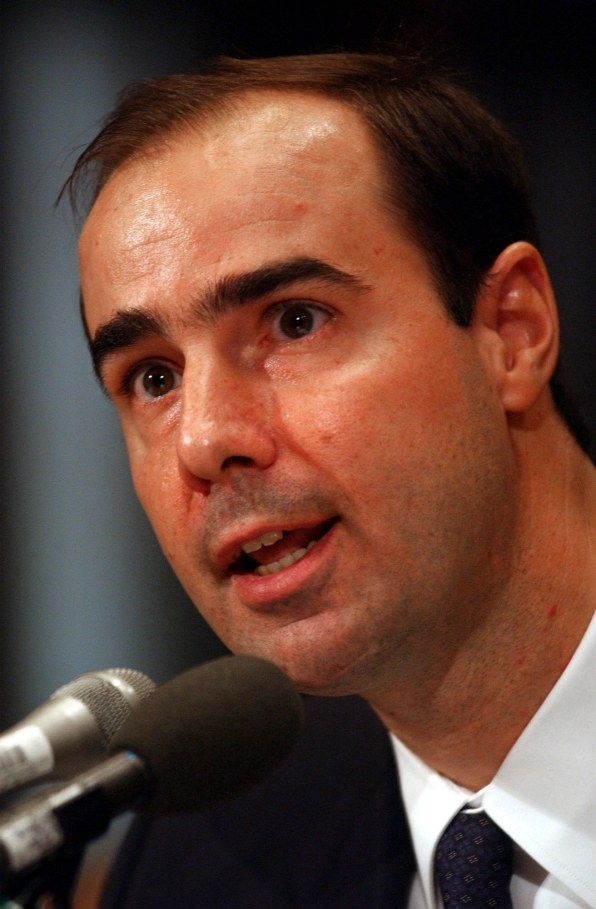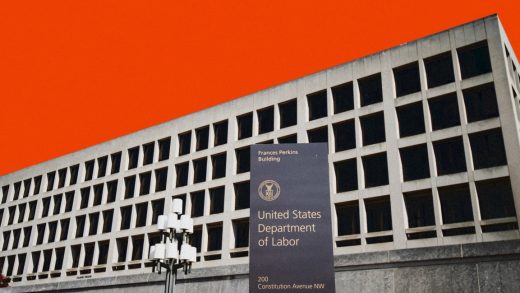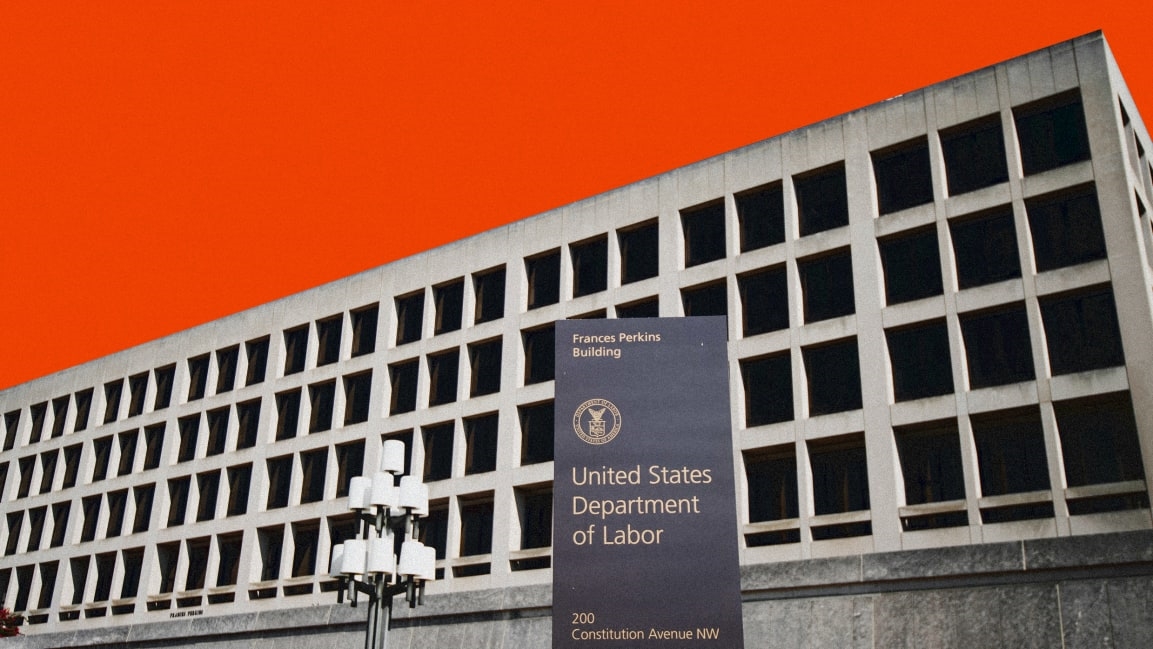Fox in the hen house? Why Trump’s latest appointment has labor advocates so alarmed
After Eugene Scalia was picked by President Trump last week to head the Labor Department, former Senator Barbara Boxer went on TV to suggest that there is another assignment for which someone with Scalia’s background as a business lawyer would be far better suited.
“Let them go . . . be the secretary of commerce, for God’s sake,” the California Democrat said.
Actually, there was a time when someone like Scalia might have worn that hat, too—and the subsequent change to this arrangement underscores why so many worker advocates are alarmed about him taking the labor job today.

[Photo:Tom Williams/Roll Call/Getty Images]
In 1903, Teddy Roosevelt signed a bill establishing a Department of Commerce and Labor. To the president—whose Square Deal domestic program sought to balance the competing interests of society—combining the affairs of business and workers under a single roof made perfect sense.
The new agency, Roosevelt declared, should address “commerce in the broadest sense,” including “scrupulously safeguarding the rights of wage worker and capitalist, of investor and private citizen, so as to secure equity” across the nation.
From the beginning, however, union leaders were worried that the department would focus inordinately on the “capitalist” side of things. “Unless there is some representative of the workers content to speak in their name,” proclaimed Samuel Gompers, founder of the American Federation of Labor, the president was sure to “be deprived of valuable and far-reaching information.”
For the next decade—and building on half a century of agitation—labor groups continued to push for their own separate cabinet-level voice for workers, likening the unified Department of Commerce and Labor to “Dr. Jekyll and Mr. Hyde.”
In 1913, the department was finally split in two. The explicit aim of the new Labor Department was to “foster, promote, and develop the welfare of the wage earners of the United States, to improve their working conditions, and to advance their opportunities for profitable employment.” The rechristened Commerce Department, meanwhile, would focus on supporting business interests, including mining, manufacturing, and shipping.
Ray Marshall, who served as labor secretary under President Jimmy Carter, says that upon entering office, he “looked up the founding documents” of the department “to see what it was all about.” And throughout his tenure, he remained heedful of his distinct role in the government.
Sharp elbows required
“I made myself pretty unpopular because I was constantly reminding my colleagues to protect the health and safety of workers and to protect the welfare of workers,” Marshall says. Among other issues, he recalls, they squared off over his insistence to raise the minimum wage.
“If the secretary of labor does not have sharp elbows,” says Marshall, “the others in the cabinet will ignore workers” much of the time.
“Business,” he adds, “is represented by any number of cabinet officials.”
Marshall maintains that his predecessors and successors—no matter which political party they’ve been from—have, by and large, honored this same ethos. “Historically,” he says, “the Republican secretaries have embraced it.”
This isn’t to say that there haven’t been major policy differences between Democratic and GOP-led Labor Departments. Under President George W. Bush, for example, there was particular weight given to enforcing union disclosure requirements. Under President Barack Obama, more emphasis was placed on investigating employers for potential wage and safety violations.
But even during the Reagan administration—which, in Marshall’s words, ushered in an era of “free-market fundamentalism”—there were those at the helm of the Labor Department who deemed it important to try to stay in their lane.
Among Reagan’s labor secretaries was William Brock. A former senator from Tennessee and U.S. trade representative, Brock had gotten to know top union officials over the years and was generally trusted, even if he wasn’t beloved, by them.
“He was not antagonist to organized labor by any means,” says Seth Blumenthal, a historian who is writing a biography of Brock.
Blumenthal also believes that this was an age when public servants such as Brock felt “a responsibility to the spirit of the department, a more reverential position to the office and the motivation for creating the institution.”
For his part, Brock says that he didn’t view other cabinet members—those at Commerce or Treasury—as adversaries. “We were all part of a team,” he says.
Yet, at the same time, he considered it his duty to advance the administration’s objectives, including encouraging economic growth, “but to do so within the framework of labor’s interests and attitudes.”
In 1985, for instance, Brock defended affirmative action as a way to help ensure nondiscrimination in hiring by federal contractors, clashing with Attorney General Edwin Meese in the process.
Can Scalia prioritize the needs of working Americans?
The central question revolving around Scalia is whether he will be willing to act, first and foremost, as a proponent of workers.
Critics note that, as a corporate attorney, he has helped to wipe out a rule meant to safeguard those seeking retirement-planning services, killed off a Maryland law mandating that certain large employers spend a prescribed dollar amount each year on health coverage for their employees, sought to raise the burden of proof needed for whistle-blowers to be protected, and vociferously opposed requirements meant to help workers avoid repetitive stress injuries.
Scalia did not respond to an interview request made through his law firm, Gibson, Dunn & Crutcher.
Some who have worked with Scalia, including during a stint when he was solicitor of the Labor Department, have held that it’s unfair to assume he won’t be faithful to the agency’s core purpose—regardless of what cases he took on in private practice.
But others are dubious. Scalia “has spent his entire career fighting for big businesses and against working people,” the National Employment Law Project has asserted.
Most revealing, perhaps, are comments from business itself. A trade group for the financial services industry issued a statement praising Scalia for his “experience navigating the intersection of Washington, American businesses, and the impact of regulation on consumers and Main Street investors.” Conspicuously absent from that list: workers.
Republican Senator Tom Cotton of Arkansas predicted that Scalia would be “a champion for working Americans against red tape and burdensome regulation.” But, of course, it’s business that typically fights “red tape” and regulation. That’s really not a huge worker concern.
If confirmed as secretary, Scalia would inherit a Labor Department that, in many respects, already has been downright hostile to workers under President Trump—his populist rhetoric notwithstanding. Among other actions, it has rolled back workplace safety protections, sought to limit overtime pay for millions of employees, and at one point proposed allowing restaurant owners and managers to pocket their workers’ tips.
Time and again in the current administration, “the impact of proposed rules on business is what shapes the agenda—not the benefit to workers,” says Sharon Block, who served as a senior aide in the Obama Labor Department and is now executive director of the Labor and Worklife Program at Harvard Law School.
She fears that having Scalia as labor secretary is likely to accelerate the trend. And that, in turn, would mark a sharp reversal of history.
If Scalia “asked my advice,” Marshall says, “I’d tell him, ‘Start with the mission of the department. It’s not your job to represent companies, employers, or anybody else.’”
And if that doesn’t persuade him, there’s always the Commerce Department. With Secretary Wilbur Ross under fire, it looks as if there could be an opening there soon. Maybe Scalia should just wait for that.
(38)



